Many individuals frequently experiment with various diets to maintain an ideal body weight. For those who struggle with restrictive or complicated plans, simple, home-based dietary practices using commonly available ingredients may offer supportive benefits. These methods, when adopted sensibly and under guidance, can complement a healthy lifestyle without depending on expensive supplements or extreme regimens.
While achieving and maintaining a healthy weight is important for individuals who are overweight or obese, it is equally essential to ensure that the diet remains nutritionally balanced. Some diets excessively restrict macronutrients like fats and carbohydrates, which may adversely affect metabolism and overall physiological functions. A sustainable plan should aim for moderation rather than elimination, supporting long-term health goals
So, which diet should you follow? What home remedies can help you to control your weight? What are the best supplements for weight loss? Read on to find the answers –

Lemon and honey are widely used household ingredients and are often included in morning routines. A warm glass of lemon water with a small amount of honey may support hydration, aid digestion, and provide a refreshing start to the day. While these ingredients have traditional uses and some health benefits, there is limited scientific evidence to suggest that they directly lead to fat loss. However, when incorporated into a balanced diet and healthy lifestyle, they may support general well-being1.
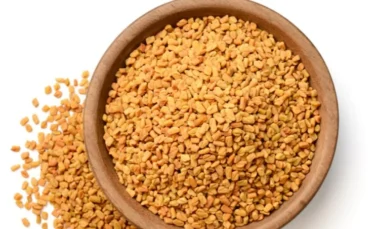
Many traditional Indian spices such as fenugreek seeds (methi), carom seeds (ajwain), and black cumin seeds (kali jeera) have been used in Ayurvedic and folk practices for digestive and metabolic support. Some preliminary studies suggest that these spices may help improve digestion and support metabolic health, which can indirectly aid in weight management. However, their role in directly reducing fat—especially in specific areas like the belly, is not conclusively proven.
A practical way to incorporate these spices is by dry roasting equal parts of fenugreek, carom, and black cumin seeds, grinding them into a fine powder, and consuming a small amount with warm water once daily. While this may help in improving digestion and metabolic support, sustainable weight loss primarily depends on balanced nutrition, physical activity, and overall lifestyle modifications.
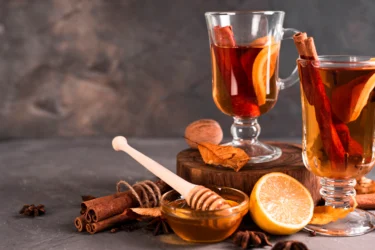
Cinnamon (Dalchini) is a Cinnamon (Dalchini) is a commonly used spice in Indian cooking, known for its distinct aroma and flavor. Some studies suggest that cinnamon may help improve insulin sensitivity and reduce blood sugar spikes, which could indirectly support weight management. However, it should be considered a supportive addition rather than a standalone solution for weight loss2.
A traditional method to include cinnamon in your routine is by preparing a simple infusion. Warm a glass of water, add 1–2 small cinnamon sticks, and let it steep. Once lukewarm, add a teaspoon of honey, mix, and strain. Consuming this on an empty stomach may offer digestive and metabolic support. However, this should complement a healthy diet and lifestyle, not replace them.
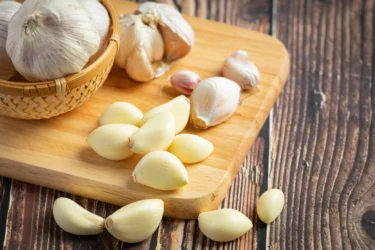
Garlic, a common kitchen ingredient, is well-known for its antimicrobial and anti-inflammatory properties. Some traditional practices suggest that consuming 1–2 raw cloves of garlic in the morning may support metabolism and overall health, which could indirectly aid in weight management. Although the strong flavor and smell may be challenging at first, regular use can become tolerable over time. It’s advisable to rinse your mouth afterward to reduce lingering odour3.
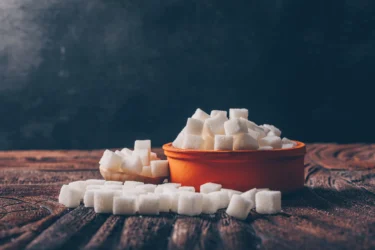
The sugars naturally found in fruits and vegetables are generally healthier than added or refined sugars. If your goal is weight loss, it is advisable to minimise your intake of processed sugars found in sweets, ice creams, and sugary beverages. Instead, focus on whole fruits and vegetables to satisfy your sweet cravings, as they come with the added benefit of fiber, vitamins, and minerals.
For example, vegetables like onions release a mild natural sweetness when sautéed slowly. This can enhance the flavour of your dishes without needing to add refined sugar. Similarly, carrots and certain types of pumpkin also contain naturally occurring sugars that contribute to a subtle sweetness. Using these ingredients creatively can help reduce your reliance on added sugars in cooking.

Drinking an adequate amount of water each day is a simple yet important factor in supporting healthy weight management. Many people do not consume enough water because they may not be aware of the recommended amounts or only drink when they feel thirsty4.

Getting adequate sleep is more of a lifestyle choice than a home remedy, but it is a simple and important step that everyone can adopt with some effort. Despite busy schedules and competing priorities, aim for at least 8 hours of sleep each night. Adequate sleep is as essential as maintaining a balanced diet for effective weight management5.
Sleep plays a critical role in regulating bodily functions, including hormone balance and digestive health. It helps maintain a healthy metabolic rate, which is important for reducing excess body fat and supporting overall weight loss.

Psychological factors play a significant role in shaping our lifestyle choices, including eating habits. The way our brain perceives our environment affects how much food we consume. For example, the size of the plate can influence portion size using a large plate may increase the risk of overeating.
This occurs because the brain associates plate size with the amount of food required. Larger plates tend to encourage larger portions, while smaller plates promote smaller servings. Eating from a smaller plate may help you feel satisfied with less food. Therefore, switching to a smaller plate can be a simple and effective strategy to support weight management6.

This eating pattern has been supported by research globally. Instead of consuming three large meals, breakfast, lunch, and dinner, try eating smaller, lighter meals every 3 to 4 hours. Consuming six lighter meals throughout the day helps prevent your stomach from being empty for long periods, which can support better digestion and energy levels7.
Eating frequent smaller meals can help prevent overeating. Long gaps between meals, such as between breakfast and lunch, can lead to excessive hunger and result in consuming larger portions. Having a small snack between meals reduces hunger and makes it easier to control portion sizes during main meals.
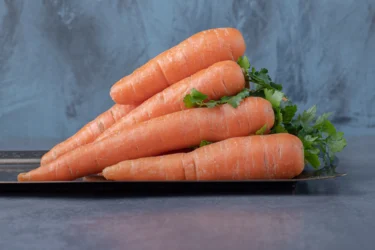
Meat, chicken and poultry should always be consumed only after proper cooking. However, some vegetables such as tomatoes, lettuce, spinach, carrots, and corn provide added nutritional benefits when eaten raw. Consider making a salad with these vegetables daily. Raw vegetables are an excellent source of fibre, which promotes healthy digestion. Efficient digestion is essential for the breakdown of fats and supports weight loss.
When consuming raw vegetables, it is advisable to choose organically grown produce whenever possible. Organic vegetables are free from insecticides and pesticides, which can be harmful when ingested raw. Incorporating raw organic vegetables into your diet is an effective natural strategy to support weight loss. Always ensure vegetables are thoroughly washed before consumption.

Proper chewing is essential for good digestion and helps prevent overeating. Studies show that people who eat slowly and chew their food thoroughly tend to consume fewer calories compared to those who eat quickly without chewing properly9.
Chewing breaks down food into smaller pieces and mixes it with saliva, which helps initiate digestion. When food is not chewed properly, the stomach takes longer to digest it, which may contribute to digestive problems and potential weight gain.
Additionally, eating slowly increases the likelihood of feeling full after consuming smaller portions.
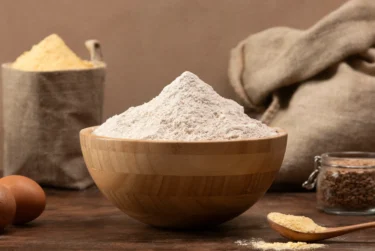
Grains are a staple food in India, consumed daily either in whole form or as flours. Whole grains offer the most health benefits. In contrast, refined grains or flours like maida are less healthy and may contribute to weight gain because they consist mainly of simple carbohydrates10. This is because the refined flours are made out of simple carbohydrates.
Whole grain flour (atta) is more beneficial as it contains a good amount of fibre along with carbohydrates. This fibre supports healthy digestion and bowel regularity. For rice, it is better to choose brown rice over white rice for the same reasons.

While this is not strictly a home remedy, quitting smoking is an important step if you want to lose weight. Smoking negatively impacts your health and can hinder your efforts to reduce excess weight. To support your weight loss and overall health, consider quitting smoking11.
Nicotine and other chemicals in cigarettes harm your body and can reduce your motivation and ability to exercise regularly. Quitting smoking can improve your overall health and make it easier to adopt an active lifestyle. Try to replace smoking with healthy habits such as a morning walk or jog.

Stress and tension are common in today’s fast-paced world, where many people juggle multiple responsibilities. While work and income are important, it is equally essential to take time to enjoy life’s simple pleasures. Studies show that individuals experiencing high stress levels may find it harder to lose weight compared to those who are more relaxed.
One effective approach is to practice meditation and breathing exercises regularly. These techniques can promote relaxation and support your weight management efforts. Breathing exercises also improve oxygen intake, which can enhance overall well-being12.
Another effective way to reduce stress is to plan family outings or vacations. Taking regular breaks throughout the year can help you feel rejuvenated and improve your overall happiness.
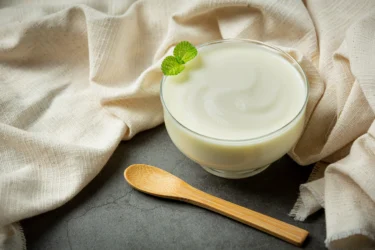
Yoghurt, a common ingredient in Indian kitchens, can be homemade or purchased from stores. It is most beneficial when consumed plain, without added sugar or flavoring. Made by fermenting milk, yoghurt contains beneficial probiotics that support gut health, along with essential nutrients found in milk13.
Yoghurt can be eaten on its own or used as a dressing for salads. It promotes the growth of healthy gut bacteria, which aid digestion. Additionally, yoghurt helps increase feelings of fullness, supporting appetite control without adding excessive calories.
In my experience of all the remedies for weight loss, Intermittent fasting for 16 hrs a day often gives good results in people who are otherwise healthy. But people with underlying conditions like diabetes, heart disease and kidney disease should not try fasting without consulting their doctor.
Dr. M.G. Kartheeka, MBBS, MD(Pediatrics)

Natural fruit and vegetable juices can be a helpful way to meet your body’s nutritional needs without consuming excessive calories. These beverages are typically low in added sugars and fats, which may assist in managing your overall intake of high-calorie foods. It is important to note, however, that while such drinks are often marketed as ‘juice cleanses for weight loss’, they do not cleanse the body in a medical sense. Rather, their benefits are generally linked to reduced calorie intake and the provision of essential vitamins and minerals, which may be especially useful when following a calorie-controlled diet14.

Crash diets are extreme eating plans that often involve prolonged fasting or the exclusive consumption of fruit juices. Such approaches can be harmful, as they may lead the body to break down muscle tissue in addition to fat. Moreover, research suggests that any weight loss achieved through these methods is frequently temporary, with individuals often regaining the lost weight over time. As a result, these diets typically do not offer sustainable or long-term health benefits15.
Rather than following extreme diets, it is advisable to consume regular meals prepared with minimal oil, sugar, and salt. Incorporate a variety of vegetables and fruits into your daily routine, along with sources of protein such as eggs, poultry, or lean meats. Adopting and maintaining this kind of balanced eating pattern, alongside a healthy lifestyle, can support overall well-being and may contribute to gradual and sustainable weight management.
Also Read: Mounjaro (Injection): Uses, Side Effects, Dosage, and How It Works
Consider trying these home-based suggestions and take note of how they work for you. If adopting all of them at once feels overwhelming, begin with just a few and focus on gradually integrating them into your daily routine. Consistent, steady efforts often lead to meaningful and lasting results. To make the process easier, establish a simple daily schedule that accommodates these practices without demanding too much of your time. As these tips are intended to be practical and manageable, they should fit well even within a busy lifestyle.
Also Read: Is Mounjaro Approved for Weight Loss? Here’s What Our Endocrinologist Says
The most effective way to manage weight at home involves a combination of a calorie-controlled diet, regular physical activity, and adequate sleep. The suggestions provided throughout this article are intended to support this holistic approach. When implemented consistently, these practices can contribute to improved overall health and gradual, sustainable weight management.
Yes, a protein-rich diet would be low in fats and would contribute to increased muscle mass and fat reduction. Individuals can have a protein-rich diet to lose weight (by reducing fat consumption) and to gain weight (by increasing muscle mass).
Rapid weight loss is generally not advisable, as it often involves extreme dietary practices such as prolonged fasting or the elimination of essential macronutrients. These methods can be detrimental to your overall health and may not result in sustainable weight loss. In many cases, any weight lost through such approaches is quickly regained once the restrictive diet is discontinued. A gradual, balanced approach is far more beneficial in the long term.
Disclaimer: The information provided here is for educational/awareness purposes only and is not intended to be a substitute for medical treatment by a healthcare professional and should not be relied upon to diagnose or treat any medical condition. The reader should consult a registered medical practitioner to determine the appropriateness of the information and before consuming any medication. PharmEasy does not provide any guarantee or warranty (express or implied) regarding the accuracy, adequacy, completeness, legality, reliability or usefulness of the information; and disclaims any liability arising thereof.
In a bid to lead a healthy life, we keep trying different hacks and healthy concoctions. Besides promising countless health benefits, they also claim to detoxify the body and help in weight loss. Although many of these remedies may not work well enough to match-up to the claims, there are some which have proven benefits! And one such drink is cumin or jeera water.
Jeera’s health benefits are well documented in the traditional ayurvedic texts, and a significant part of these has been verified by modern science as well. Jeera seeds have been used in most Indian kitchens since ancient times. This spice adds a nutty and earthy flavour to foods and is said to be packed with several health benefits. One of the easiest way to experience the benefits of this wonder spice is to consume the jeera seeds soaked in water.
In this blog, we will discuss in detail about the potential benefits of jeera water, how and when to consume it and if there are any precautions and risks you must be wary of when considering jeera water in your routine diet. So, let’s get started!
Before we move onto the benefits, let’s first see how to prepare jeera water.
To prepare jeera water, all you need to do is soak a handful of cumin seeds in water and let it rest overnight. Being soaked for that long, the seeds swell up and release bioactive compounds into the water. Consuming this concoction in the morning everyday can help support your overall health in several ways.
Here is how it can help and why it is an ultimate detox drink:
Jeera is naturally low in calories. One teaspoon of jeera seeds contains only about eight calories1! That’s very low compared to other beverages.
Cumin seeds are loaded with antioxidants that play a significant role in fighting oxidative stress. Extracts of cumin seeds are rich in polyphenols and numerous other compounds, which help detoxify the body by eliminating toxins from the system but also help boost immunity2.
Drinking jeera water regularly helps keep the digestive system healthy, which in turn, keeps the overall body functioning on track. It helps to break down complex nutrients like proteins, fat, and sugar to keep your gut healthy, and may keep digestive issues such as bloating, indigestion, diarrhoea, and nausea at bay. Jeera seeds have been found to be helpful in relieving symptoms in digestive issues like Irritable Bowel Syndrome3.
Jeera or cumin is believed to lower appetite and accelerate body metabolism to promote fat burning, aiding in weight loss efforts2.
A daily exercise routine, however simple it is, keeps the body fit and helps in fat-loss. Jeera water can add to the calorie-burning effects of following a regular exercise regime, not to forget a balanced diet to complete the overall health benefit!
Studies have shown that cumin seeds have anti-inflammatory properties due to the presence of bioactive compounds. These can help regulate the mediators of pain and inflammation in body and prove to be helpful in managing symptoms and alleviating conditions like arthritis and kidney disease2,4.
Jeera water is proposed to have anti-cancer properties. It reduces the risk of a variety of cancers and helps avoid metastasis, which is the spreading of cancer to other parts of the body5.
Jeera water can help improve insulin sensitivity, that is the utilization of blood sugars by body cells. It also helps enhance insulin secretion and avoid sudden spikes in blood sugar levels, thus aiding in the management of type 2 diabetes mellitus6.
Jeera water helps in hydrating the body. The water content also helps to flush out toxins from the body.
Cumin seeds are said to be gastro-protective. They contain compounds which help neutralise stomach acids and are effective in reducing acidity and mitigating its symptoms like heartburn, pain, nausea, bloating, constipation, etc2.
Cumin seeds are rich in iron. Iron is required for the formation of haemoglobin in the blood, which is further essential for the transport of oxygen in the body. Drinking jeera water regularly helps to reduce the risk of and deal with the symptoms of anaemia such as fatigue and breathlessness7.
Jeera water helps in regulating blood pressure, triglycerides, and cholesterol levels in the body. These are essential to keep the heart heathy. Moreover, jeera seeds are rich in antioxidants that can help keep the heart protected from various disorders8.
Jeera water is proposed to contain antioxidants and antimicrobial compounds which can help detoxify the body. It lowers acne risk and protects the skin from infections, thus supporting a healthy and glowing skin.
Jeera water is good for the hair as well. It strengthens hair and helps avoid hair loss, dandruff issues and premature greying of hair. However, these could be signs of an underlying medical condition and should be examined by a dermatologist before resorting to home remedies.
Many women face discomfort during their menstrual cycles having symptoms such as backache, fatigue and cramps. It is found that drinking jeera-infused water can beneficial in relieving these symptoms. Traditionally, cumin seeds were also believed to regularise menstrual blood flow by stimulating the uterus to contract and releasing any trapped blood, although there is no scientific evidence to these claims9.
Also, jeera is also believed to support milk production in lactating women. It is enriched with iron, which is healthy for consumption by lactating women.
Cumin water when drunk with a teaspoon of honey and black pepper works is believed to work as a great aphrodisiac tonic in traditional medicine.
Although studies have shown potential benefits of jeera water, further large-scale human research is needed to prove these claims. Also remember, if you have any medical condition or are any facing symptoms, always consult your doctor before initiating any home remedies.
A good source of dietary fibre is found in jeera (cumin) water, which may aid with piles and constipation. Studies10 have revealed that constipation, combined with infections in the anal tract, which are also brought on by constipation, is the primary cause of piles. Jeera has carminative, stimulant, anti-fungal, and anti-microbial qualities due to the presence of essential oils that contain cuminaldehyde and various pyrazines. Thus, jeera water may promote natural urination, aid in the recovery of infections or wounds in the digestive and excretory systems, and quicken digestion.
Dr. Siddharth Gupta, B.A.M.S, M.D (Ayu)
Consumption of jeera water at the beginning of the day, after waking up, is the optimal time to do so. The benefits of jeera water on an empty stomach early in the morning include aiding in digestion, reducing any bloating and potentially being beneficial for weight loss. The drink can be consumed any time throughout the day, but the maximum benefits of jeera water can be availed when consumed early in the day.
Since cumin or jeera water has a bland taste, you can try having it with a pinch of lemon juice or cinnamon powder. This will make the detox water appealing to your taste buds, as well as your health goals.
Jeera water may have several health benefits, yet excess consumption can be harmful and may lead to side effects like:
The consumption of jeera increases the release of more gas in the gastrointestinal tract. The excessive release of gas is attributed to causing heartburn in some individuals.
People who are susceptible to hypoglycaemia should be wary of the consumption of cumin water. Cumin has the tendency to reduce blood sugar levels. The consumption of cumin water can reduce blood sugar levels to a great extent which can offset hypoglycaemia. Thus, if you have diabetes, kindly check with your doctor or nutritionist before starting the same.
High levels of jeera water consumption during pregnancy may have the possibility of increasing the chances of a miscarriage or inducement during labour. Pregnant women should limit their consumption of jeera water and discuss with their gynaecologist before consuming the same.
Cumin has the possibility of slowing down the process of blood clotting in the body. This can increase the bleeding time from cuts and bruises. If you are consuming blood thinning medication, then its best to avoid cumin water.
Jeera is an amazing condiment that has a host of health benefits, yet consumption in moderation is the best way to see its effects on the body. Jeera water may work wonders for the body, however, a healthy lifestyle goes a long way in keeping you healthy and fit.
It is believed that jeera simultaneously acts as a stimulant and a relaxing agent. Research10 indicates that a healthy diet, adequate vitamin intake—particularly B complexes—and excellent digestion, with jeera supplementation contribute to restful sleep. In ancient Ayurvedic medicine, jeera water is consumed before bed to promote restful sleep.
Dr. Rajeev Singh, BAMS
Also Read: Top Health Benefits of Buttermilk
In conclusion, jeera water is a remarkable drink packed with numerous health benefits, making it an excellent addition to a healthy lifestyle. From aiding in weight loss and improving digestion to boosting metabolism and reducing inflammation, this simple concoction potentially offers a range of advantages. Incorporating jeera water into your daily routine, along with a balanced diet and regular exercise, can help contribute to your overall well-being. However, it is essential to consume jeera water in moderation to avoid potential side effects. Also, if you have any medical condition, it is always advised to consult your healthcare provider before incorporating jeera water or any other home remedies in your routine.
Also Read: 10 Benefits Of Drinking Water From Copper Bottle Vessels
Jeera water itself is very low in calories. The main calorie content would come from the cumin seeds (jeera) used to make the water. Typically, 1 teaspoon of cumin seeds contains around 8 calories. However, the number of calories in jeera water as a drink is negligible unless large quantities of seeds are used.
Jeera water is believed to have a warming effect on the body according to ayurveda. Jeera seeds contain compounds that can stimulate digestion and metabolism, which may lead to a slight increase in body heat. This warming effect is often associated with improved digestion and circulation, but individual reactions may vary.
Yes, jeera water can be consumed at night. It is often recommended to drink jeera water before bedtime to aid digestion, promote better sleep, and potentially boost metabolism. However, moderation is key, as consuming too much liquid before bed could disrupt sleep by causing frequent urination.
Yes, jeera water can be consumed daily as part of a balanced diet. It offers various potential health benefits, including improved digestion, metabolism, and potential weight management support. However, like any dietary supplement, moderation is advised, and individual tolerance should be considered to avoid any adverse effects. Its best to consult a doctor if you have any medical conditions.
There is no scientific evidence to suggest that jeera water can induce periods. While cumin seeds are known for their potential benefits in digestion and overall health, they do not possess properties that can regulate menstrual cycles or induce periods.
Jeera water may be beneficial for fatty liver. Cumin seeds contain antioxidants and compounds that can support liver health by promoting digestion, reducing inflammation, and potentially aiding in fat metabolism. However, it should be consumed as part of a balanced diet and lifestyle changes recommended by a healthcare provider for managing fatty liver disease.
Jeera water may have some beneficial effects on uric acid levels. Cumin seeds (jeera) contain antioxidants and compounds that can help in reducing inflammation and improving digestion, which may indirectly contribute to managing uric acid levels. However, specific scientific evidence regarding jeera water’s direct impact on uric acid levels is limited, so it’s advisable to consult with a healthcare provider for personalized recommendations.
There is no direct evidence to suggest that jeera water causes acne. In fact, cumin seeds (jeera) contain antioxidants and antimicrobial properties that may help in reducing inflammation and promoting clear skin. However, individual reactions to foods and drinks can vary, so if you notice any adverse effects, it’s best to discontinue use and consult a dermatologist if necessary.
Disclaimer: The information provided here is for educational/awareness purposes only and is not intended to be a substitute for medical treatment by a healthcare professional and should not be relied upon to diagnose or treat any medical condition. The reader should consult a registered medical practitioner to determine the appropriateness of the information and before consuming any medication. PharmEasy does not provide any guarantee or warranty (express or implied) regarding the accuracy, adequacy, completeness, legality, reliability or usefulness of the information; and disclaims any liability arising thereof.